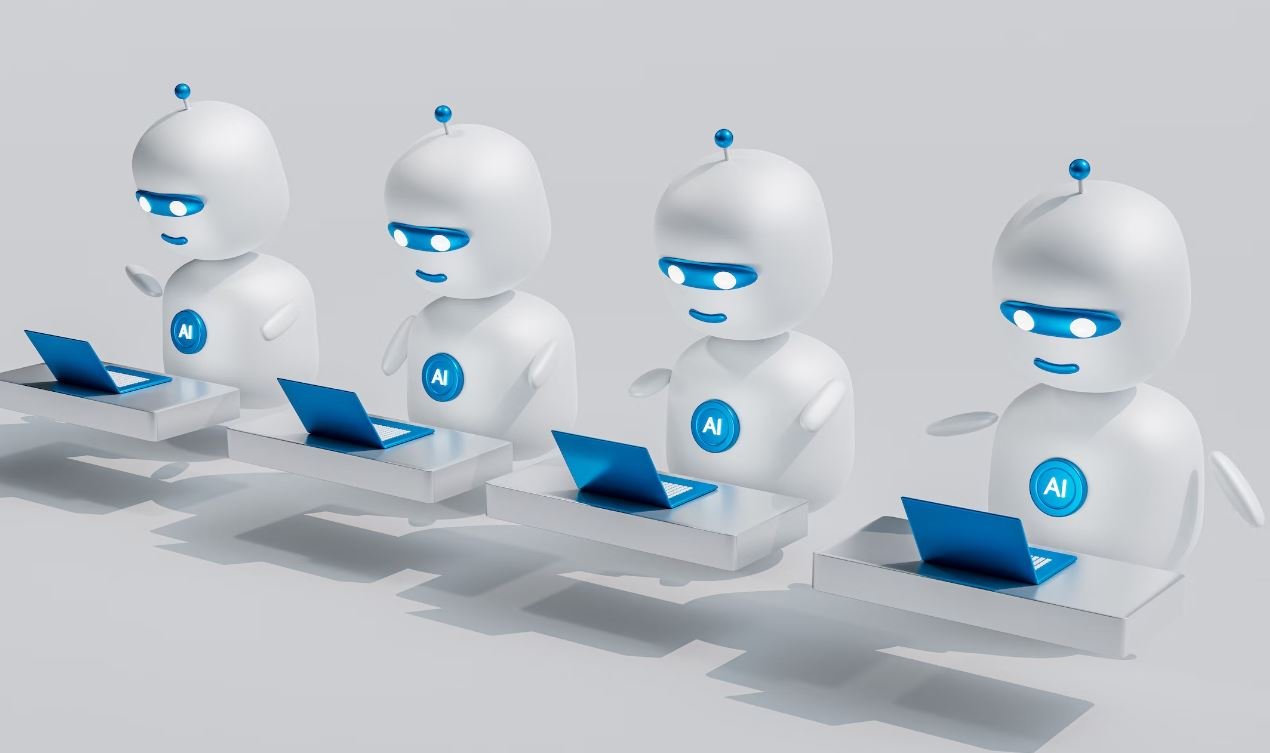AI for Coding
Artificial Intelligence (AI) is revolutionizing various industries, and coding is no exception. AI for coding, also known as AI-assisted programming, is an emerging field that aims to streamline and enhance the coding process. By leveraging AI algorithms, developers can automate repetitive tasks, gain insights, and improve their productivity. Let’s explore the benefits, applications, and future of AI for coding.
Key Takeaways:
- AI for coding automates repetitive tasks and improves productivity.
- This emerging field aims to enhance the coding process using AI algorithms.
- AI-assisted programming is beneficial in various applications and industries.
- The future of coding lies in AI-powered tools and platforms.
The Benefits of AI for Coding
AI for coding offers several benefits that can significantly impact developers and the coding process. One of the primary advantages is the automation of repetitive tasks. **By utilizing AI algorithms**, developers can automatically generate code snippets, fix common bugs, and perform code refactoring. This automation saves time and allows developers to focus on more complex and creative aspects of coding.
*For example*, an AI-powered code completion tool can suggest, based on historical coding patterns, the next lines of code a developer might need, reducing the time it takes to type and search for specific code snippets.
Moreover, AI can assist developers in detecting and fixing complex bugs. It can analyze code patterns, identify potential issues, and provide recommendations for resolving them. AI for coding also promotes cleaner and more efficient code by suggesting refactoring options to enhance readability and performance.
Applications of AI for Coding
The applications of AI for coding span across various industries and coding scenarios. **AI-assisted programming** can be particularly helpful in the following areas:
- Software Development: AI algorithms can aid in the development of new software applications, automating parts of the coding process, and enhancing overall efficiency.
- Code Review: AI can analyze code to identify potential bugs, vulnerabilities, and coding conventions violations, streamlining and improving the code review process.
- Legacy Code Maintenance: AI for coding can assist in maintaining and updating legacy systems by understanding existing code and suggesting modifications or updates.
*For instance*, in software development, AI can analyze extensive code repositories to identify patterns and best practices, providing developers with insights to improve their coding standards and practices.
The Future of AI for Coding
The future of coding is undoubtedly intertwined with AI. As technology advances, we can expect to see more sophisticated AI-powered tools and platforms that revolutionize the way developers code. These tools will enable developers to write code more efficiently, catch bugs earlier, and enhance collaboration.
AI for coding holds immense potential for tackling complex coding challenges and improving software quality. As developers continue to embrace AI-assisted programming, the coding process will evolve, leading to more efficient and robust software solutions.
Tables with Interesting Data Points
| Industry | Benefits of AI for Coding |
|---|---|
| Finance | Improved algorithmic trading strategies |
| Healthcare | Automated medical diagnosis and analysis |
| Automotive | Enhanced autonomous vehicle software development |
| AI for Coding Tools | Features |
|---|---|
| Code completion tools | Suggest the next lines of code based on patterns |
| Bug detection | Analyze code for potential bugs and provide recommendations |
| Refactoring assistance | Suggest code optimizations for improved performance |
| Popular Programming Languages | AI Tools Integration |
|---|---|
| Python | Integrated support for code completion and bug detection |
| JavaScript | AI-assisted code refactoring and optimization suggestions |
| Java | Automated code review with AI algorithms |
With the continuous advancement of AI, developers can look forward to more intelligent coding assistance, enabling them to write cleaner, more efficient, and error-free code.

Common Misconceptions
Misconception: AI will replace human developers
One common misconception about AI for coding is that it will completely replace human developers. However, this is not the case as AI is designed to assist and enhance human capabilities rather than eliminate the need for human intervention.
- AI can automate repetitive coding tasks, allowing developers to focus on more complex problems.
- AI can augment a developer’s skillset by providing suggestions and recommendations based on vast amounts of data.
- Human developers bring creativity, problem-solving abilities, and critical thinking that AI currently lacks.
Misconception: AI will write flawless code
Another misconception is that AI can write flawless code without any bugs or errors. While AI can generate code snippets and assist in error detection, it is still prone to mistakes and requires human oversight to ensure quality.
- AI may produce code that functions correctly but may not be optimized for performance or maintainability.
- Human developers possess domain knowledge and expertise to make informed decisions that AI may overlook.
- Code generated by AI should be thoroughly reviewed and tested by humans to minimize potential issues.
Misconception: AI will make learning programming unnecessary
Some people believe that with AI for coding, learning programming languages is unnecessary since AI can do all the work. However, this misconception neglects the value of understanding programming concepts and principles.
- Learning programming provides a foundational understanding of how code works, enabling developers to make informed decisions and troubleshoot issues more effectively.
- Understanding programming languages allows developers to customize and fine-tune AI tools to suit their specific needs.
- AI for coding is a tool to augment programming skills, not a substitute for learning the craft.
Misconception: AI will take jobs away from developers
There is a common concern that AI for coding will result in job loss among developers. While AI can change the nature of certain tasks, it is unlikely to eliminate the need for human developers altogether.
- AI can free developers from repetitive and time-consuming tasks, allowing them to focus on higher-level problem-solving and innovation.
- The demand for skilled developers will continue to grow as technology advances and new opportunities arise.
- Developers can adapt their skills to leverage AI tools and collaborate effectively with AI-powered systems.
Misconception: AI can replace the need for collaboration
Some individuals believe that AI can replace the need for collaboration among developers, but this overlooks the value of teamwork and human interaction in software development.
- Collaboration fosters creativity, knowledge-sharing, and diverse perspectives, leading to better problem-solving and innovative solutions.
- Understanding and translating business requirements into code often requires human input and coordination.
- AI can enhance collaboration by facilitating knowledge sharing and providing insights, but it cannot replace human interaction and effective communication.

AI Programming Languages on the Rise
As AI continues to advance, so does the need for better programming languages to facilitate its development. This table showcases some of the emerging programming languages utilized in AI applications.
| Language | Popularity (Rank) | Features |
|---|---|---|
| Python | 1 | Simple syntax, extensive libraries |
| Rust | 2 | Memory safety, concurrency |
| Julia | 3 | Efficient mathematical operations |
| Kotlin | 4 | Interoperability, null safety |
| TensorFlow | 5 | Deep learning framework |
Applications of AI in Healthcare
The healthcare industry has greatly benefited from the integration of AI technologies. This table provides examples of AI applications that have revolutionized medical practices.
| Application | Description |
|---|---|
| Image Analysis | AI algorithms analyze medical images for better diagnostic accuracy. |
| Medical Record Management | AI systems automatically organize and retrieve patient records. |
| Drug Discovery | AI assists in identifying potential drug candidates for various diseases. |
| Robot-Assisted Surgery | AI-powered surgical robots perform complex procedures with precision. |
| Virtual Health Assistants | AI chatbots offer personalized medical advice and support. |
AI Ethics Guidelines
As AI systems become more prevalent, ethical considerations become crucial. This table outlines key ethical guidelines that govern AI development and deployment.
| Guideline | Description |
|---|---|
| Transparency | AI systems should provide clear explanations for their decisions. |
| Privacy | AI should protect and respect user data privacy at all times. |
| Accountability | Developers and organizations are responsible for AI system behavior. |
| Fairness | AI systems must avoid bias and discrimination in their decisions. |
| Human Oversight | Human involvement should be maintained in critical AI processes. |
AI in Sports Analytics
The use of AI has revolutionized the way sports teams analyze their performance. This table showcases some AI applications in the field of sports analytics.
| Application | Description |
|---|---|
| Player Tracking | AI systems track players’ movements to gather insightful performance data. |
| Injury Prevention | AI algorithms analyze player biometrics to predict and prevent injuries. |
| Game Strategy Optimization | AI helps coaches optimize game strategies based on opponent analysis. |
| Fan Engagement | AI enhances fan experience through personalized content and recommendations. |
| Referee Assistance | AI systems aid referees in decision-making during matches. |
AI in Finance
The financial sector has embraced AI to improve efficiency and gain a competitive edge. This table highlights key applications of AI in the finance industry.
| Application | Description |
|---|---|
| Algorithmic Trading | AI-driven algorithms execute high-frequency trades for optimal profits. |
| Risk Assessment | AI models analyze vast amounts of data to predict financial risks. |
| Fraud Detection | AI systems identify patterns indicative of fraudulent activities. |
| Customer Support | AI-powered chatbots provide quick and accurate financial assistance. |
| Portfolio Management | AI algorithms help optimize investment portfolios for better returns. |
AI and Autonomous Vehicles
Artificial intelligence plays a critical role in the development of autonomous vehicles. This table presents examples of AI technologies utilized in self-driving cars.
| Technology | Description |
|---|---|
| Computer Vision | AI systems analyze real-time camera feeds to detect and track objects. |
| Machine Learning | AI models learn from data to optimize vehicle control and decision-making. |
| LiDAR | Laser-based sensors generate detailed 3D maps for navigation and obstacle avoidance. |
| Natural Language Processing | AI enables voice commands for control and interaction with the vehicle. |
| Predictive Analytics | AI predicts and responds to potential hazards on the road. |
Challenges in AI Development
Despite the rapid progress, certain challenges persist in AI development. This table highlights some prominent challenges faced by researchers and developers.
| Challenge | Description |
|---|---|
| Data Quality | Access to reliable and diverse data for AI training is often limited. |
| Ethical Dilemmas | AI can raise ethical questions regarding its societal impact and accountability. |
| Algorithmic Bias | Unintentional bias in AI algorithms can lead to unfair or discriminatory outcomes. |
| Security Concerns | Hackers exploiting vulnerabilities in AI systems pose a significant threat. |
| Job Displacement | The automation potential of AI raises concerns about job loss in various industries. |
AI in Gaming
The gaming industry has harnessed the power of AI to deliver immersive and intelligent gameplay experiences. This table showcases AI applications in gaming.
| Application | Description |
|---|---|
| Procedural Content Generation | AI generates dynamic and unique game content, such as maps and levels. |
| Non-Player Characters | AI-controlled characters exhibit realistic behavior and adapt to player actions. |
| Intelligent Game Design | AI algorithms analyze player preferences to optimize gameplay experiences. |
| Realistic Physics Simulation | AI enables accurate and interactive physics simulations in games. |
| Behavioral Prediction | AI predicts player behavior to enhance game difficulty and engagement. |
Future of AI
The field of AI continues to evolve rapidly, promising numerous advancements and opportunities. This table explores potential breakthroughs in the future of AI.
| Breakthrough | Potential Impact |
|---|---|
| General AI | Creation of AI systems with human-level intelligence across multiple domains. |
| Quantum AI | Utilizing quantum computing to enhance AI performance and capabilities. |
| Explainable AI | Development of AI models that can provide understandable explanations for their decisions. |
| AI-Augmented Creativity | AI assisting in artistic and creative endeavors, pushing the boundaries of human imagination. |
| Brain-Computer Interfaces | Direct communication between AI systems and the human brain for enhanced cognitive abilities. |
Conclusion
AI has permeated various aspects of our lives, transforming industries and opening new frontiers. From programming languages aimed at simplifying AI development to AI’s impact on healthcare, finance, and gaming, its potential knows no bounds. Ethical considerations, challenges, and future breakthroughs further shape the trajectory of AI. As we explore this ever-evolving field, it is crucial to navigate the possibilities and complexities with responsibility and careful consideration.
AI for Coding – Frequently Asked Questions
What is AI for Coding?
AI for Coding refers to the application of artificial intelligence (AI) techniques and machine learning algorithms to assist programmers in various coding tasks. It aims to automate certain aspects of coding and improve developer productivity.
How does AI for Coding work?
AI for Coding typically involves the use of natural language processing (NLP) algorithms to understand code and programming languages. It can analyze large codebases, provide code recommendations, and even generate code snippets based on the developer’s requirements.
What are the benefits of using AI for Coding?
Using AI for Coding can have several benefits, including:
- Improved code quality and readability
- Increased developer productivity
- Faster bug detection and fixing
- Enhanced code suggestions and autocomplete
- Efficient code search and documentation
Can AI for Coding replace human programmers?
No, AI for Coding is designed to assist programmers and enhance their productivity, not to replace them. It can automate certain repetitive or time-consuming tasks but still relies on human programmers to make informed decisions and solve complex problems.
Are there any popular AI for Coding tools available?
Yes, several popular AI for Coding tools are available, such as:
- Tabnine
- Kite
- DeepCode
- CodeGuru
- Codota
Can AI for Coding be used with any programming language?
AI for Coding can be used with most programming languages, including popular ones like Java, Python, JavaScript, C++, and more. The availability and effectiveness of AI for a specific programming language may vary depending on the tools and algorithms used.
Is AI for Coding only beneficial for experienced programmers?
No, AI for Coding can benefit programmers of all skill levels. It can assist beginners by providing code suggestions, helping with syntax errors, and offering learning resources. Experienced programmers can benefit from advanced features like code analysis, bug detection, and optimization suggestions.
Are there any privacy concerns with using AI for Coding?
Privacy concerns may arise when using AI for Coding, especially if the tool requires access to the developer’s code or code repositories. It is important to review the privacy policies of the AI tools and ensure that sensitive code or information is not exposed to unauthorized access.
How accurate is AI for Coding in generating code?
The accuracy of AI for Coding in generating code snippets or suggestions depends on various factors, including the quality of the training data, the complexity of the coding task, and the specific tool or algorithm used. While AI can provide valuable suggestions, it is always recommended to review and verify generated code before deploying it in production.
Is AI for Coding a replacement for traditional coding education?
No, AI for Coding should not be considered a replacement for traditional coding education. It can complement coding education by providing additional assistance and support to programmers. Understanding the underlying concepts and principles of coding is still essential for mastering programming skills.




